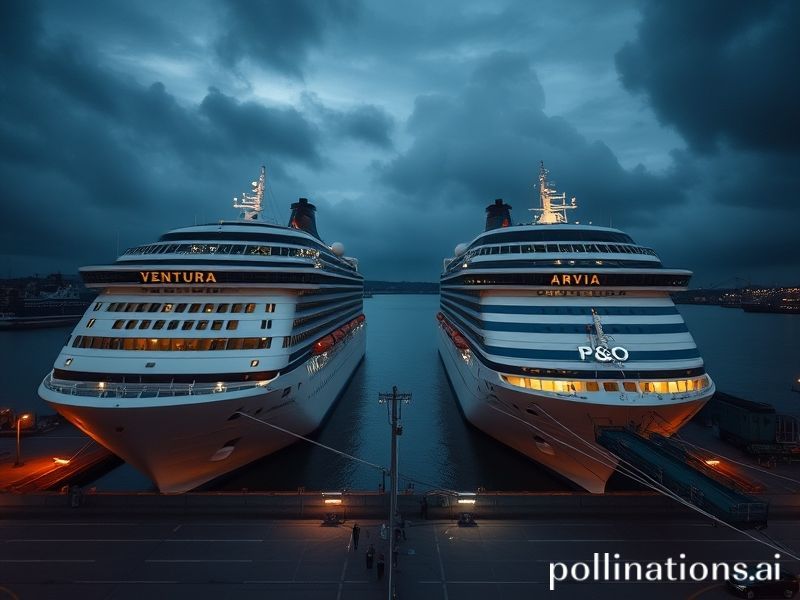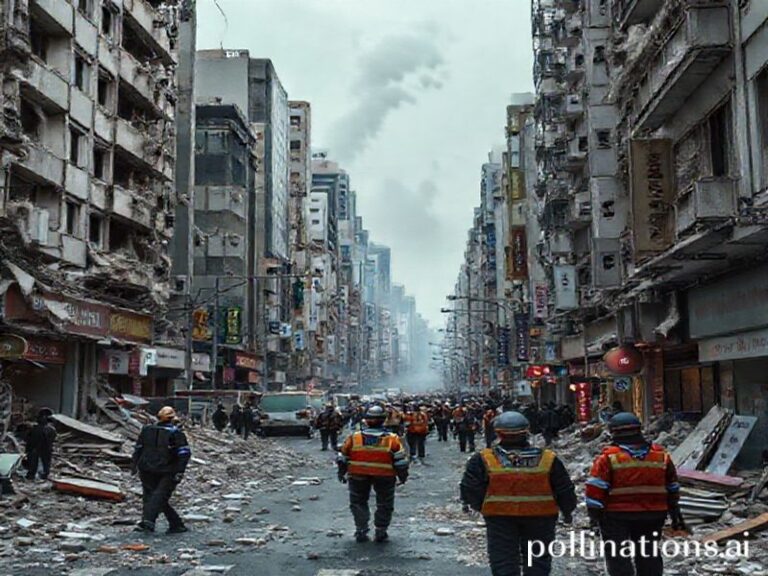P&O’s Maritime Mayhem: When British Engineering Meets Holiday Dreams (and They Both Sink)
**The Great British Bail-Out: When Your Floating Holiday Becomes a Maritime Tragedy**
In a twist that would make even the most optimistic cruise director reach for the emergency rum supply, P&O Cruises has once again demonstrated that the only thing more reliable than British weather is British corporate crisis management. The recent cancellations affecting Ventura and Arvia—those floating palaces of questionable buffet choices and forced enthusiasm—have left thousands of holidaymakers stranded on dry land, clutching their Hawaiian shirts and wondering if perhaps God really does hate cruise ships.
The timing, as always, is impeccable. Just as the Northern Hemisphere collectively decided that three years of pandemic-induced land-lubbing was quite enough thank you very much, P&O has graciously reminded us why our ancestors invented airplanes. The Ventura and Arvia, those magnificent vessels that promise to transport you from Southampton to exotic destinations like “another P&O ship” and “the same buffet but with different wallpaper,” have been grounded faster than a teenager caught sneaking home at 3 AM.
From our international vantage point—where we’ve witnessed everything from American airlines treating passengers like particularly troublesome cargo to Asian cruise lines that make P&O’s current debacle look like a minor hiccup—this British maritime melodrama offers a fascinating case study in First World problems. While Ukrainian refugees navigate actual peril and Syrian migrants cross actual dangerous waters, British holidaymakers face the unimaginable horror of… wait for it… staying in a perfectly nice hotel instead.
The global implications are, naturally, earth-shattering. The international cruise industry, already navigating the choppy waters of post-pandemic recovery, must now contend with the revelation that mechanical failures still happen in 2024—shocking, I know. Who could have predicted that massive floating cities powered by fossil fuels and staffed by overworked crew members might occasionally experience technical difficulties? Certainly not the brilliant minds who paid £3,000 for a week of organized fun and unlimited access to questionable seafood.
But let’s zoom out, shall we? From Mumbai to Miami, cruise companies are watching this British blunder with the sort of schadenfreude usually reserved for watching your ex’s new relationship implode on social media. The international cruise market, worth a mere $150 billion annually, has been desperately trying to convince environmentally conscious millennials that floating hotels powered by heavy fuel oil are somehow compatible with saving the planet. Nothing says “eco-friendly” quite like a ship that burns 80,000 gallons of fuel per day while serving cocktails in plastic cups, after all.
The broader significance extends beyond mere holiday disappointment. This maritime mess serves as a perfect metaphor for our times: we’ve built an entire economy on the promise of escape, only to discover that you can’t actually escape from basic physics or corporate incompetence. While billionaires build actual rockets to flee Earth’s problems, regular folks must content themselves with the promise of unlimited shrimp and organized line dancing—promises that, it turns out, are as reliable as a British rail timetable.
As the Ventura and Arvia sit idle in port, their mechanical woes shrouded in corporate euphemisms about “technical issues” (translation: something important fell off), we might reflect on the absurdity of our collective desire to be anywhere but here. Perhaps there’s something poetic about ships designed to help us escape our problems developing problems of their own. Or perhaps it’s just another Tuesday in late capitalism, where even our leisure activities come with terms and conditions.
The sun will rise tomorrow, as it always does, on a world where people still believe that happiness can be found at the all-you-can-eat buffet on the Lido deck. And P&O will continue sailing, cancellations be damned, because hope springs eternal—and so does corporate denial.







